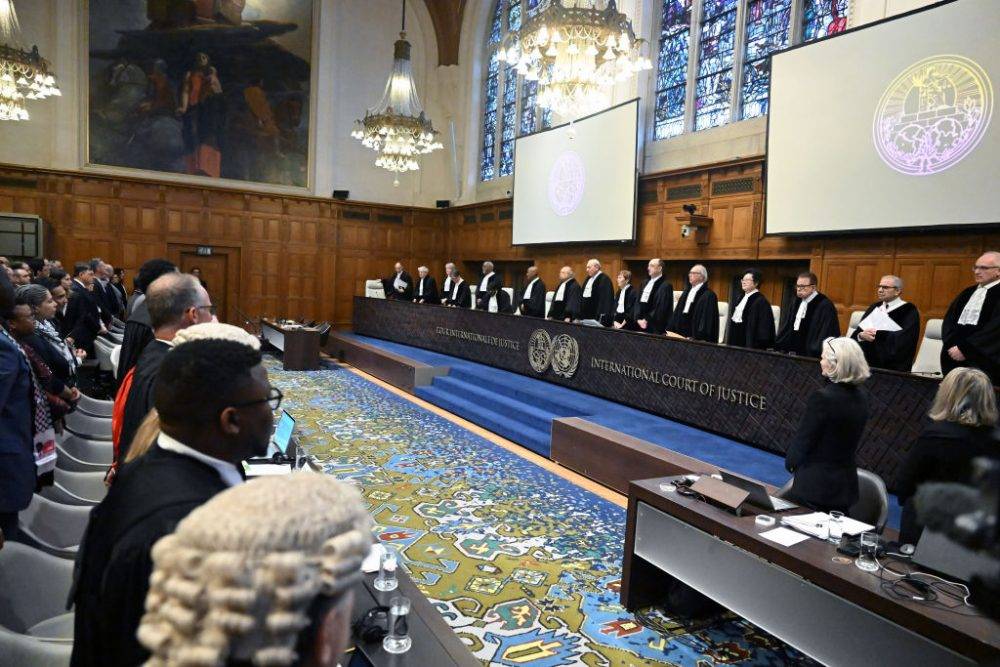Since the South African government took Israel to the International Court of Justice, there has been an election, and a government of national unity has been formed.
In September 2024, a network of activists, some embedded in the state and in government, others in senior roles in public universities and still others with strong links to the centres of political power, mobilised to expel a conference from the site of the Constitutional Hill in Johannesburg. At stake is the integrity of South Africa’s public domain.
The struggle for democracy has a sting. Once democracy has been established formally, its rights and privileges are universal — that is, they should extend equally to all who have citizenship in the political community.
In South Africa, some of the rights associated with democracy are even granted to those who are not citizens. The democratic victory, in other words, extends rights, not only to those who participated in the liberation struggle. Therein lies a paradox — those who delivered democracy must relinquish the idea that it somehow belongs to them.
Democracies are especially vulnerable to authoritarianism. When an individual or a political party claims that the place of power coincides with them — when, for example, they claim to be the sole authentic representative of the people, such that the people themselves would be deprived of power if they were removed — then democracy becomes its opposite.
In a similar vein, when individuals or ideas are driven out of the public domain by those in power, then the “place of power” loses its democratic character. Claude Lefort, one of the great theorists of democracy, describes this as a “totalitarian” risk inherent in democracy itself.
The history of the 20th century can be written in the shadow of this paradox. Revolutionary political movements, from Communist parties to national liberation movements, once in power, shut down democratic contestation, jealously guarding their status as the sole “authentic” representative of the people. Populism stalks democratic regimes today, across Europe and in the US and in South Africa.
I raise these preliminary points to offer a political analysis of the targeting of the African Global Dialogue.
The African Global Dialogue was a public policy event, an initiative of the New South Institute (NSI), a public policy think tank. It works on institution building and democratisation in complex environments, largely post-colonial and post-socialist. It focuses on major public policy issues, from public service reform to corruption and state capture, welfare, to migration and to war and conflict.
Believing in the simple mantra that good policy is evidence-based and/ or evidence-informed, the NSI decided to host a series of discussions to better understand the history, the politics and the legal situation in the Middle East. When the war in Gaza is over, unless there are major shifts in the political environment, including in the political discourses that frame the situation, there will be another war — as has been happening since 1948.
What role could South Africa play in disrupting this cycle positively? This question is especially relevant in the light of two local developments:
First, since the South African government took Israel to the International Court of Justice (ICJ), there has been an election, and a government of national unity has been formed. Second, in December 2024, South Africa will chair the G20 group of countries and there is an opportunity, at least formally, to shape the global political agenda.
In addition, as the NSI, we wanted to have such a discussion in Johannesburg, to insist on the importance of hosting discussions on major, global topics in the Global South, and not just in Washington or London.
We approached many people, all of great experience and expertise in their fields, though not necessarily people we know or agree with. We approached historians and sociologists, psychoanalysts and major legal experts, we approached scholars either close politically or close in sympathy to radical Palestinian groups.
Some replied to our invitation, some did not. Some were available, some were not. Some liked our broad approach and others did not. Nonetheless, we put together an excellent and diverse programme, including important South African and global experts, many of whom had never been heard before in South Africa.
In the words of American author and journalist Ta-Nehisi Coates, the point of dialogue is not to reach a consensus — it is to show that it is possible to create a space in which multiple perspectives can be represented, on their own terms and without illusions.
In this spirit, we drew up a list of people we thought would be interested in participating in the discussion: journalists, policymakers, public intellectuals, businesspeople, academics. And we invited them to an in-person event, also making it possible to join online for a wider audience — all standard and unremarkable activities for a conference.
Then something unexpected happened. Somebody leaked the list of invitees and circulated it in the public domain, where it was given a sinister spin. People on the list were told that we had added them to the programme without telling them. This was not true. We had already created a website and the list of speakers who had agreed to participate had long been made public.
There was no one on the programme who had not agreed to be. No one. It was said that we had deliberately shared the invitation list as if it was a list of confirmed attendees. This was also not true.
A prominent post-colonial scholar apparently claimed that he knew nothing about the event and dismissed the mention of his name as “false publicity”. He knew that this was not the case, though it contributed to the sense that there was something dishonest about the way the conference had been organised.
He wrote to me just days before the event saying, “I would have wanted to [sit] at the conference you are organising and listen. I don’t think I have much to offer in terms of useful insight. I rather wanted to learn from the various speakers. Unfortunately, as things stand, I won’t be in SA at the time of the conference.”
In fact, he had asked to be included on the programme and had requested that the invitation be sent to his personal email address on 23 July, which it was. He formally registered for the conference on 17 August at 8.28am. He would have seen his name on the list of speakers on the website when he registered, as well as the details of other panellists, even if he had missed the provisional programme attached to his email.
Then the attacks started. The Boycott, Divestment and Sanctions campaign launched into us, saying that we were a Zionist front trying to whitewash the genocide in Gaza. Invited guests were encouraged to denounce the event and speakers were approached to cancel.
Etienne Balibar, a philosopher who is also a major figure on the global left, was approached and asked to withdraw. He chose, nonetheless, to participate, requesting, however, that he be allowed to read out his full conference memorandum.
Some criticised us for not having consulted the “progressive movement” when we organised the dialogue, a strange Stalinist request. Others denounced us for having invited the controversial Israeli historian Benny Morris, even though Mehdi Hassan had hosted him on Al Jazeera just two weeks before.
On 12 September, the acting chief executive of Constitution Hill wrote to say that the venue was “no longer available”. We had booked the location on 25 June, had paid a deposit and had a signed contract. It seemed like an ideal place for the conference.
The holding company, through its “We the People” campaign, explicitly states that it “strives to inspire a proud, knowledgeable and creative people by making the Constitution and its history accessible to all; to promote informed dialogues about our past, present and future; and to encourage people to take greater action towards building trust in our constitutional democracy”. It represents a space where complex and painful conversations can be had, with the additional promise of “a peaceful and just resolution”.
Beyond the contractual issues, the withdrawal of the venue represented a physical and symbolic attack on South Africa’s public domain. It is likely that the African Global Dialogue was prevented from using the site because several advocacy groups, supported, it seems, by politicians in the Gauteng provincial government and senior public servants, disagreed with the nature of the event and opposed the presence of some of the speakers. At stake was the very principle of Con Hill as a site of open, democratic discussion.
In the face of such a serious challenge to South Africa’s constitutional promise, incredibly, on the very site of the constitutional court, South Africans should have expected a more fulsome defence of the principle of dialogue from the company’s trustees. Instead, they publicly washed their hands of the whole thing, issuing a statement that seemed to distance themselves more from the African Global Dialogues itself, than from those seeking to close it down.
“[W]e would like to make it clear,” the trustees stated in a public letter, “that the Constitution Hill Trust has no involvement in the conference entitled Narrative Conditions Towards Peace in the Middle East being organised by the African Global Dialogue”.
“It has not been discussed by the Trust. Venue approval is not in the mandate or powers of the Trust. For clarity, the Constitution Hill precinct is the property of the Gauteng government which it manages through its wholly-owned entity, the Constitution Hill Development Company.”
The withdrawal of the venue was celebrated as a triumph. In a press statement released on 19 September 2024, the BDS announced: “The campaign to expose African Global Dialogue as a genocide-washing conference has been successful! This conference has not been able to go ahead as planned at Constitution Hill or any public venue.”
BDS thanked everyone who joined the action, insisting that it was “unconscionable that an event discrediting South Africa’s case against Israel for genocide at the International Court of Justice could possibly take place at Con Hill, a living memorial to our liberation struggle and post-apartheid democracy”.
One particularly enthusiastic demagogue wrote that it was a “great day for South Africa and our beloved constitutional court, which rejected Zionist Ivor Chipkin’s attempt to host his Zionist conference there!!!”
“We won!!! We shut Zionist Ivor Chipkin down at Constitution Hill. Proudly South African.”
The BDS’s particular claims about the event — that it was a genocide-denying event intended to discredit South Africa’s case at the ICJ — are easily dismissed. One only had to listen to Balibar’s intervention to realise this or to that of Radmila Nakarada, the former chair of the Truth and Reconciliation Commission established at the end of the Yugolsav wars.
The panel on International Humanitarian Law was a rare gathering of some of the greatest legal scholars in the world. Nicole Fritz made a very moving and compelling defence of South Africa’s ICJ case. All of this, together with the speaker’s written comments, will soon be available on the African Global Dialogue website — the real one, that is, not the fake “parody” account with its crude, racist tropes. (One can only be impressed by the time, resources and organisation dedicated by the opponents of the African Global Dialogue to disrupt it.)
Even had the BDS slur been partly correct that there was an implicit critique of the ANC government’s decision to go to the ICJ behind the dialogues, since when is disagreeing with government policy an outrage? The very idea is preposterous.
This was not simply a case, however, of cancel culture manifesting at a university event or at a private institution. Important political figures, senior government officials, together with well-organised activists, worked together to purge the public domain of an initiative with which they disagreed.
The deputy secretary general of the ANC, Nomvula Mokonyane, participated in the protests and, according to the BDS, promised to enlist the premier of Gauteng Panyaza Lesufi himself, to pressure the Con Hill to cancel the event. Did this happen, I wonder?
In other words, the African Global Dialogue appears to have been expelled from Con Hill by people who occupy senior positions in university administrations, who are embedded in powerful political networks and with access to state power. These were not students or subalterns speaking truth to power. This was power itself interrupting the search for truth.
Without irony, they celebrated this purge as a democratic victory, conflating the public domain with themselves, and literally occupying the site. In this way, they revealed their authoritarian political culture and, together with the dozens of people that joined in the frenzy of denunciations, subverted the idea and practice of democracy in democracy’s name.
Ivor Chipkin is the co-founder and director of the New South Institute.





















Discussion about this post